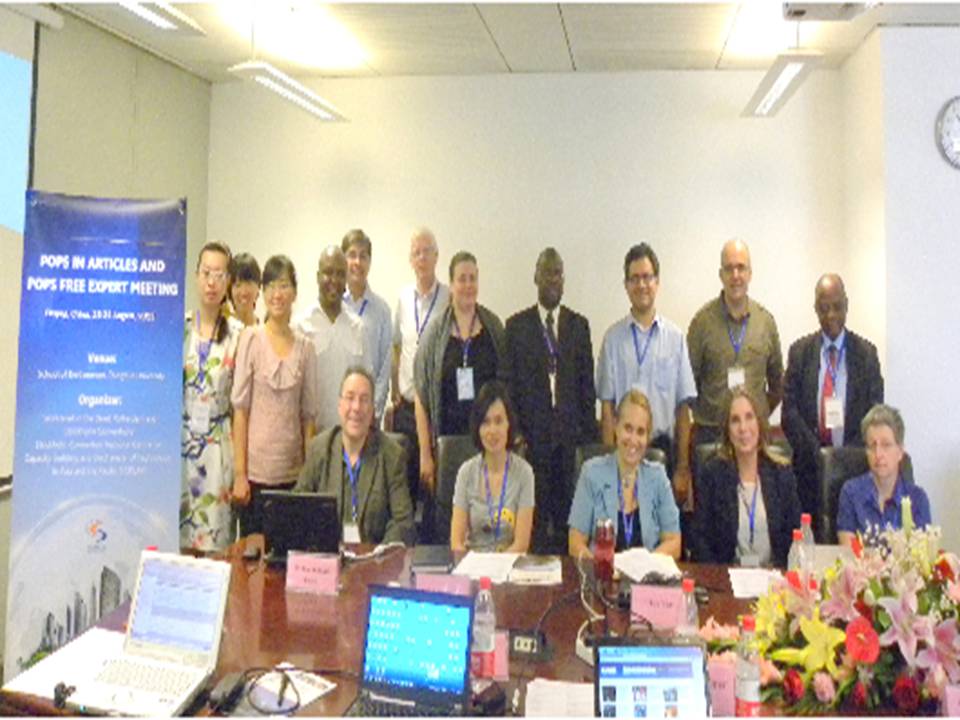

Abonnez-vous aux SCP News
Attendance to the Stockholm Convention’s Global workshop on updating National Implementation Plans

The Regional Activity Centre for Cleaner Production participated from 26th to 29th August 2013 in Beijing (China) in the global workshop on updating National Implementation Plans (NIPs) of the Stockholm Convention on Persistent Organic Pollutants (POPs), including revising of dioxins inventories. The workshop was held at the Basel and Stockholm Convention Regional Centre for capacity building and the transfer of technology in Asia and the Pacific (SCRCAP-China), hosted by the School of Environment of the Tsinghua University in Beijing. Ten countries were represented in the workshop by the National Focal Points of the Stockholm Convention, of which two -Albania and Bosnia & Herzegovina- are also parties of the Barcelona Convention for the protection of the Mediterranean sea against pollution.
Different Regional Centers of the Stockholm Convention attended also the meeting: The Regional Center for Cleaner Production of the Mediterranean Action Plan (CPRAC), the Basel Convention Coordinating Centre for Training and Technology Transfer for the African Region, the Research Centre for Environmental Chemistry and Ecotoxicology (RECETOX), the Stockholm Convention Regional Centre - CSIR India, and the Stockholm Convention Regional Centre for Capacity-building and the Transfer of Technology in Asia and the Pacific, and also there were representation from different bodies of the United Nations ( Secretariat of the Stockholm Convention, UNDP China, UNIDO, UNITAR, UNEP Chemicals and UNEP / Regional Office for Asia and the Pacific (ROAP).
The process of the reviewing and updating of the NIPs is an obligation of the countries pursuant to article 7 of the Stockholm Convention, with the main objective to address the new chemicals listed in 2009 and 2011: Endosulfan; Lindane and its 2 isomers; Chlordecone; comercial penta-bromodiphenyl ether and octa-bromodiphenyl ether; Perfluorooctane sulfonic acid, its salts and perfluorooctane sulfonyl fluoride; Hexabromobiphenyl and Pentachlorobenzene . With regard to the last chemical added in Annex A in 2013 by the Conference of the Parties of the Stockholm Convention, the flame retardant hexabromocyclododecane (HBCDD), it is not mandatory to include it in the new updated NIP but it would be convenient if possible to make a first assessment of its situation in the countries.
During the workshop, the Secretariat presented guidance that might be required to assist the countries in their development and implementation of the Convention, in order to restrict or eliminate the newly listed POPs, such as guidance on establishing inventories, controlling the import of new POPs, selecting best available techniques (BATs) and Best Environmental Practices (BEPs) for the management of new Pops. While updating their NIPs in order to address the newly listed POPs, parties should also evaluate the effectiveness of the action plans and strategies included in the original NIP.
The workshop included also a field visit to an e-waste recycling factory (HUAXIN GREEN SPRING), and to the Dioxin Analysis laboratory of theSchool of Environment of the Tsinghua University in Beijing.

photo: participants in the experts' meeting about POPs in articles
Previously to this workshop, there was a two-days meeting about POPs in articles and phasing-out opportunities in emerging countries. During this workshop, Frederic Gallo from the CP/RAC made a presentation (pdf) about activities in support of the phasing-out of POPs, as the suport to the SUBS PORT initiative, a state of theart resource of information on safer alternatives to hazardous chemicals. Also there were presented three outstanding successful cases of chemicals substitution or elimination, like PAXYMER (non-hazardous flame retardant), RUDOLF GROUP (non-hazardous waterproofing agent) and COCOMAT (matresses and linen made only with natural substances and no chemical additives).















